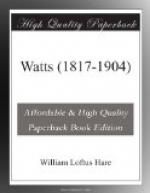Watts used to recall, as the happiest time in his life, his youthful days as a choral singer; and he always regretted that he had not become a musician. Besides being fond of singing he declared that he constantly heard (or felt) mystic music—symphonies, songs, and chorales. Only once did he receive a vision of a picture—idea, composition and colours—that was “Time, Death, and Judgment.” Music, after all, is nearer to the soul of the intuitive man than any of the arts, and Watts felt this deeply. He also had considerable dramatic talent.
In 1864 some friends found for Watts a bride in the person of Miss Ellen Terry. The painter and the youthful actress were married in Kensington in February of that year, and Watts took over Little Holland House. The marriage, however, was irksome, both to the middle-aged painter and the vivacious child of sixteen, whose words, taken from her autobiography, are the best comment we possess on this incident:
“Many inaccurate stories have been told of my brief married life, and I have never contradicted them—they were so manifestly absurd. Those who can imagine the surroundings into which I, a raw girl, undeveloped in all except my training as an actress, was thrown, can imagine the situation.... I wondered at the new life and worshipped it because of its beauty. When it suddenly came to an end I was thunderstruck; and refused at first to consent to the separation which was arranged for me in much the same way as my marriage had been.... There were no vulgar accusations on either side, and the words I read in the deed of separation, ’incompatibility of temper,’ more than covered the ground. Truer still would have been ‘incompatibility of occupation,’ and the interference of well-meaning friends.
“‘The marriage was not a happy one,’ they will probably say after my death, and I forestall them by saying that it was in many ways very happy indeed. What bitterness there was effaced itself in a very remarkable way.” (The Story of My Life, 1908.)
In 1867, at the age of fifty, without his application or knowledge, Watts was made an Associate, and in the following year a full Member, of the Royal Academy. Younger men had preceded him in this honour, but doubtless Watts’ modesty and independence secured for him a certain amount of official neglect. The old studio in Melbury Road, Kensington, was pulled down in 1868, and a new house was built suited to the painter who had chosen for himself a hermit life. The house was built in such a way as would avoid the possibility of entertaining guests, and was entirely dedicated to work. Watts continued his series of official portraits, and many of the most beautiful mythical paintings followed this change. Five years later, Watts was found at Freshwater in the Isle of Wight, and in 1876 he secured what he had so long needed, the sympathetic help and co-operation in his personal and artistic aims, in Mr. and Mrs. Russell Barrington, his neighbours.




